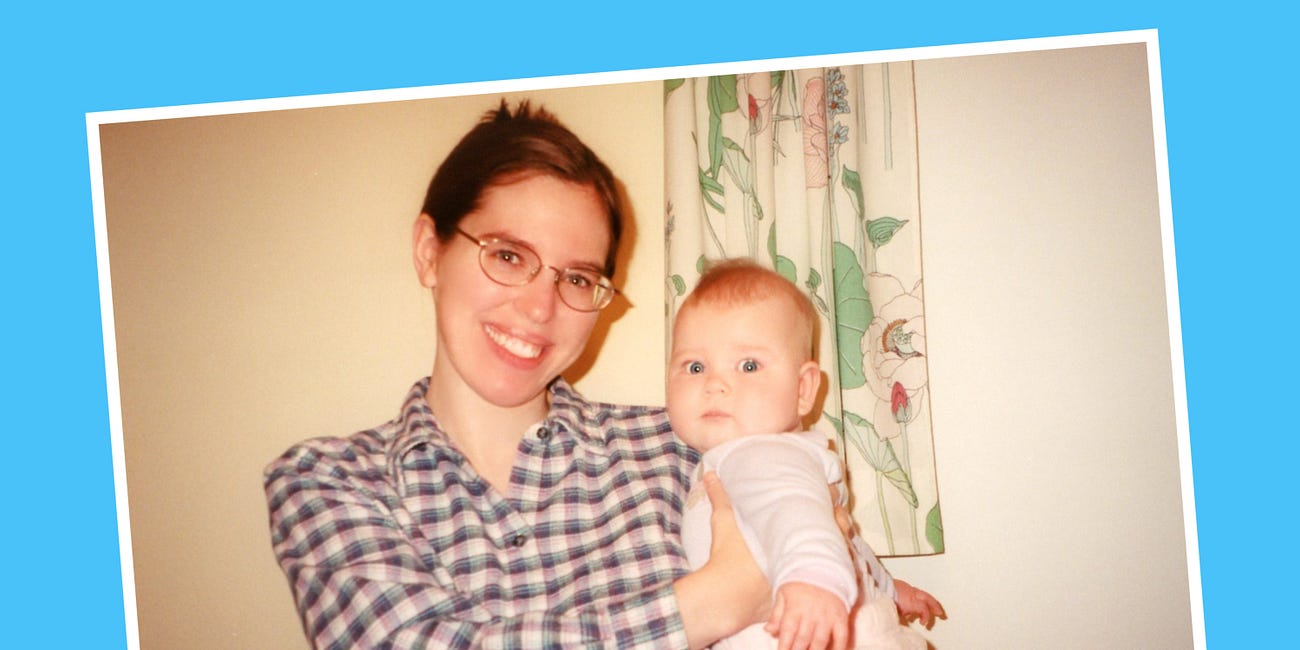My late '90s choice: Have a baby now or wait? Whose body is it anyway?
The nineties offered a new version of treating women’s bodies like machines. And your career depended on your ability to conform.
Exactly 25 years ago, I graduated from pharmacy school. So this month, I took an unplanned detour to write about my career start.
I never planned on becoming a pharmacist. At the start of high school, I wanted to be a journalist. But by the end, I wanted something to count on. I’d seen my mom struggle through commission-only work, put off needed medical care due to gaps in insurance, and then file bankruptcy after my stepdad’s medical bills kept coming—even after he died.
Nursing seemed perfect. I knew there’d always be a job. Plus, nursing could be more than a job. I could feel like I was making a difference. Seeing my stepdad slowly die from liver cirrhosis left me with frustration and deep sadness; I wanted to do something with those feelings to make something better. It seems a lot of people enter healthcare fields after a family member's illness or loss. Caring for others can feel self-healing in return.
On top of that, I saw nursing as a fresh-start chance—one I needed after my drama- and trauma-filled high school years, with a transcript filled with mostly D’s. I remembered watching my babysitter study for nursing classes after she dropped out of high school to have a baby. She was beyond excited. Nurses can be life-saving for the people they care for, and becoming a nurse can be life-changing too.
But just before nursing school, I switched my major to pharmacy, having second thoughts after working as a nurse assistant in a large medical center. Working alone or in a smaller group started sounding pretty darn good—a story I told in “Feeling Like Screaming in 90s Boomer Culture.” It’s not that I had a problem with boomers—some of the most amazing people I know and love are boomers. The problem was with “the one.” In this case, a verbally abusive doctor.
“And then there was the golden one, who got away with anything because he was so special and important. He made his bad day, your bad day. Always surrounded by women helping him, sometimes saving his ass. All he did was disrespect them. Were you lucky enough to work with him? Pretty enough? Thin enough? Unsure? Well, he’ll tell you. No matter how many people complained, nothing was done, ever.”
Grad School Escape
Soon after starting pharmacy school, I found an even better escape while working as a chemistry research assistant. What could be better than working alone in a lab or in my headspace alongside a few other over-passionate over-thinkers? I felt safe while fully engaged in the present—something I hadn’t felt since I was a kid.
What’s more, underneath my lab coat and safety glasses I felt freedom from the caged feeling of being defined by my body—an inescapable burden that every teen girl and woman I knew seemed to have.
Being a young woman in the nineties sucked, and I wanted the hell out. At the start of the nineties, I felt like driving off that cliff with Thelma and Louise. By the late nineties, I’d given up hope that girls and women would ever be treated with respect by the culture at large. And I’d given up hope that “the ones” would ever be held accountable for their behavior. The decade's symbolic Girls Gone Wild theme was “it’s all her fault.”
I knew I was buffered from the worst of the nineties by being in pharmacy school and having a safe, supportive partner. I was grateful but also felt guilty about being a spared "bad girl turned good" because I felt like I had to throw my old self under the bus to get there.
By accepting my new position and the privileges that came with it, wasn't I also buying into the whole cultural norm of wrongfully shaming girls and women? In the complicated mix of feelings, I felt ambivalent about complaining—and I hated my new self for that. “Internalized misogyny is so shitty,” as I’ve written about before, playing out in different ways over generations.
I didn't know how to be myself anymore. Hiding in one clearly defined, precise role away from lots of people seemed like the better option. But at some point, it didn’t feel like a choice. Once you’re "bitten by the research bug," all you see is one life path toward this singular obsession.
Forgoing a pharmacist's salary for years of the minimum wage had no bearing on my decision. And while my husband’s full-on support shouldn’t have been a big deal, it was. I knew that. I loved him for it. And still do—marrying him was the best decision I’ve ever made.
I saw the pressures other women my age and older faced. Pressures to maximize their financial contribution while having babies on schedule to avoid any disruption in career—and, more importantly, income. Yes, those were cultural pressures. But lots of women seemed to feel those pressures from their spouses as well.
In December 1998, I was about to graduate from pharmacy school, and we were about to move to Kansas where I accepted a PhD fellowship in Medicinal Chemistry. My husband had a new job lined up. He’d graduated the previous summer. With the money we’d saved while staying at my mom’s, we put money down on a house. Seriously, in 1998 you could buy a brand-new 3BR/2.5BA single-family home in Kansas for under 120K.
The nineties offered a new version of treating women’s bodies like machines. Different rules, same control, and always super-human expectations.
I Don’t Want to Wait
But as the weeks drew closer, I started feeling twinges of loss for a baby I hadn’t yet had and told myself I didn’t want any time soon. I felt her in my arms. I saw her tiny pink embroidered onesies with Peter Pan collars at stores, the kind that would never get worn. I heard her tiny, helpless cries (not the banshee-sounding kind tiny babies actually make).
Why is this happening now? I’d been telling myself for years, “I ain’t no baby machine”—literally writing this note-to-self in my teenage diary. I was the first woman in my family to go to college and wanted to follow the “smart” woman’s rules for success: No baby before thirty. No more than two. And no large gap—in babies OR career.
Reading my old diaries has been incredibly insightful. I can hear myself trying to make sense of the changing possibilities for women as higher education and reproductive healthcare became more available—and should be guaranteed. Not being a “baby machine” seemed so 21st century, and I wanted every part of being a modern, independent woman.
Looking back now, I see how the rigid expectations of how and when women have babies never really ended. The nineties offered a new version of treating women’s bodies like machines—different rules, same control, and always super-human expectations.
Don’t have a baby—don’t even want a baby—until the moment is perfect for everything and everyone else.
Then boom: Get pregnant, grow a baby, birth a baby, and recover from having a baby with minimal disruption to everyone and everything, most notably income.
Bounce right back to your prepregnant life and always-hot body.
And because breast is best, nurse your baby on demand while keeping up with every other demand.
Flow with abundant milk any time you attach a baby or plastic pump to your breast—and NOT when you’ve got more important work to do.
I really did think my body was a machine. And I went into motherhood having unrealistic expectations and hearing constant comparisons. If she can do it, why can’t you? If you did it before, why can’t you do it again? There was no room for individual variation, changing your mind, or needing something different than what you were supposed to want.
Despite those messages, in 1998, I also kept hearing Paula Cole sing “I don’t want to wait for our lives to be over / Will it be yes or will it be sorry?”—and I knew I’d feel more sorrow about not having a baby soon than never getting a PhD.
The start of 1999 began with an actual blizzard and a whirlwind week for my husband and me.

I backed out of the Kansas fellowship—with deep regret, embarrassment and a feeling of shame. Just before the closing date, we got out of the Kansas house and on a whim put money down on a Chicago suburban 1960s fixer-upper that looked kinda cozy under the piles of snow. My husband told his current employer JK on the job resignation. And I called Walgreens because I knew that’d be the quickest place to get hired.
In the second part of this story, I write about my experience working as a Walgreens pharmacist in North Shore Chicago—the hardest damn job I’ve ever had.
Related reading:
So You Became a Mom
Three big things happened the summer I turned 14. I found out my aunt was pregnant. We finally got MTV. And the 1988 summer heat wave convinced my mom and stepdad that A/C was a must-have. With high school about to start, my life seemed to be on fast forward.
Moving past the mom-labels
First birthdays weren’t a big thing in the 70s. There’s no picture of me when I turned one. But I remember my younger brother’s big day a few years later. As his big sister, I got to pick out a Gerber baby rattle from Jewel, along with a Duncan Hines cake mix. But when I had my first baby in 2000, I found out that somewhere along the way, first birthday…









